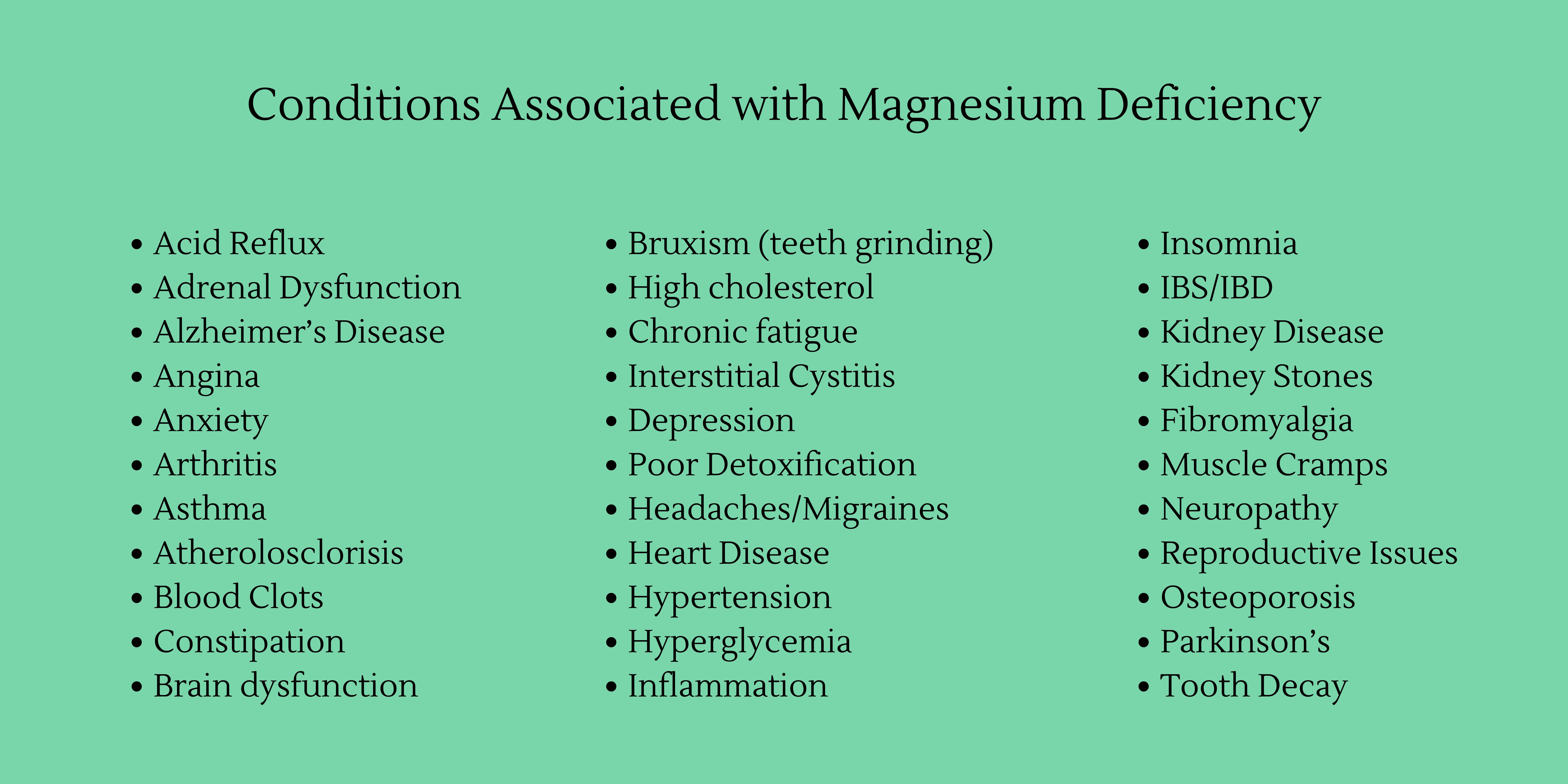
The importance of magnesium when it comes to health cannot be emphasized enough. Magnesium is involved in the proper functioning of 700–800 enzyme systems in the body. It is absolutely essential for the production and storage of ATP (energy) in the mitochondria of our cells - six of the eight steps in require it. Magnesium is also necessary for vitamin D absorption and metabolism which means you might actually have a magnesium deficiency causing low vitamin D! Our master antioxidant, glutathione, also requires magnesium for its synthesis.
Magnesium plays an important role in heart health, bone density, blood pressure, blood sugar regulation, sleep, and even nerve and back pain (to name a few things!). In fact, low magnesium is an underlying factor in the development of insulin resistance. It can also help prevent blood clots and constipation.
Unfortunately, like many other nutrients, we are not getting enough through our diet whether that’s due to low levels in our soil and/or the average person’s lack of consuming enough nutrient dense foods. It’s estimated that between 70-80% of people are deficient. Magnesium is RAPIDLY depleted by stress making our magnesium needs much higher. There are other things that deplete magnesium including strenuous exercise, alcohol, soda, caffeine, and many pharmaceutical drugs. Birth control pills, hormone replacement (estrogen), corticosteroids, diuretics, proton pump inhibitors, statins, blood pressure medication, antifungals, and antibiotics all potentially deplete magnesium.
The best way to test your magnesium level is to look at RBC Magnesium levels. Serum testing, which is what most doctors and hospitals use, is not going to give you an accurate result. It will almost always look like you are within range. The ideal/optimal range for RBC levels should be 6.0-6.5 mg/dL. The most bioavailable forms are magnesium bicarbonate, glycinate, and malate. The L-threonate form is also excellent for brain health because it can cross the blood-brain barrier.
Magnesium Glycinate (helps with sleep, calming – take in the afternoon/evening)
Gaia Magnesium Glycinate 400 – available on Fullscript
Magnesium Malate
Jigsaw Health MagPure Malate – available on Fullscript
Magnesium Bicarbonate (my preferred form, most bioavailable, helps get magnesium into the mitochondria, drink at least an hour away from food). You can purchase this in a liquid form or use the DIY instructions below to make it yourself.
Mitigate Stress Master Mineral Drink- use code NOURISHTHRIVE for 10% discount
Why is the bicarbonate form especially beneficial?
Many forms of magnesium are not very bioavailable, which means you have to take more to get enough. Magnesium bicarbonate is absorbed into the bloodstream with water directly through the small intestine and estimated to be 80% or more bioavailable compared to most magnesium supplements which are 4-30% bioavailable. This means that you don't need as much to maintain healthy levels.
What’s unique about bicarbonate is it helps transport the magnesium into our mitochondria which are the powerhouse of our cells. Think of mitochondria like batteries in our cells that are producing ATP. If your batteries are low, then you will not have energy!
Magnesium bicarbonate is also very alkaline which helps to balance the pH in the body. Another benefit of magnesium bicarbonate is that it can help remove calcium in the soft tissue. In addition, magnesium bicarbonate has been shown to support cardiovascular health, muscle recovery, and bone health.
What you will need to make your own magnesium bicarbonate:
1-liter bottle of carbonated water chilled (the colder, the better). I recommend purchasing a soda stream or something similar and using high quality filtered water. I don't recommend using store bought carbonated water. I've found it doesn't typically have enough carbonation to fully activate the magnesium.
Crucial Four Magnesium Hydroxide Powder - use code NOURISH for 10% off first orderSmall funnel
To prepare the water follow these steps:
1. Fill the soda stream bottle to the fill line with distilled or reverse osmosis water and then chill it in the fridge. You want the water to be as cold as possible so that it will mix and dissolve better.
2. Measure out 1 tsp of magnesium hydroxide powder and use the funnel to add it to the bottle after the water is cold. Put the lid on and give it a shake to mix the powder in. Use the soda stream to carbonate the water. Shake the bottle vigorously for 30 seconds or so making the liquid cloudy.
3. After 20-30 minutes the liquid will have cleared, and any un-dissolved magnesium hydroxide will have settled to the bottom of the bottle. Again shake the bottle vigorously for 30 seconds or so, making the liquid cloudy again. Continue to do this over the next hour. When the liquid is clear after shaking then all of the magnesium hydroxide should have reacted with all of the CO2 to become dissolved (ionized) magnesium and bicarbonate. You may note that the sides of the bottle “cave in” when the liquid clears. This is a sign that the reaction is complete. If a small amount of un-dissolved magnesium hydroxide still remains in the bottom of the bottle as a sediment it may be ignored. It should be kept in the refrigerator and will last for 2 weeks.
The concentrated magnesium bicarbonate water will have approximately 88mg/oz. Start by drinking 1oz of the magnesium bicarbonate water mixed with water on an empty stomach over a 20 minute period twice a day. The magnesium bicarbonate is very alkaline so avoid drinking it with food because it will neutralize your stomach acid affecting digestion. Drinking too much at once can cause loose stools so you want to slowly increase the amount you are drinking up to 3-4oz.
A general rule of thumb is a dosage of 5mg of magnesium per pound of body weight if your magnesium levels are low. So, for a person who weighs 150lbs they would likely need approximately 750mg per day. If you are taking magnesium bicarbonate then you might need less than this. I highly recommend testing so you know exactly what your needs are.


